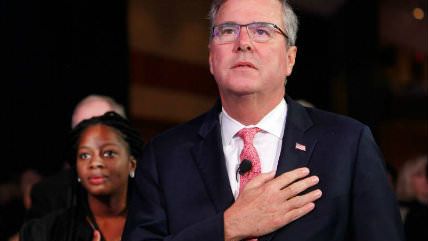Republican Powerbrokers Intend to Clear the GOP Field for a Favored Establishment Candidate
Republicans actually have to sort out some substantive differences on policy. Coronations do not lend themselves to self-examination.

Although the specifics are still hazy, The New York Times reports that a group of deep-pocketed Republican donors and bundlers has hatched a plan to clear the GOP field of all insurgents to make room for a favored "establishment" candidate—preferably Jeb Bush, Chris Christie, or Mitt Romney. But there can only be one.
This strikes me as a dubious strategy for a number of reasons. But the main point of the Times piece is to inform everyone that Republican powerbrokers intend to get ahead of the intraparty squabbling that accompanies the long primary season because, in the end, all of that ugliness would only help elect Hillary Clinton:
For the first time in decades, the Republican Party is facing a wide-open primary with up to a dozen serious candidates representing virtually every branch of the party. Republican leaders, hoping to minimize damage to their eventual standard-bearer, have already sought to compress the formal primary season and reduce the number of candidate debates.
There are a number of problems with this pitch.
To begin with, there's scant evidence that bypassing crowded primaries enhances a party's chances of winning a national election. If you take a look at some of the "wide-open" races (ones without preordained vice presidential successors) over the past few decades, you'll find that plenty of candidates prevailed in the general election after winning competitive—and sometimes acrimonious—party contests. Ronald Reagan in 1980. Bill Clinton in 1992. George W. Bush in 2000. Barack Obama in 2008. In some cases, it was the establishment that was won over in the process. All of these races determined the course of party politics for years.
These days, there is incessant whining about the slog of the primary and debate season from the media. This may just be a perfunctory complaint. But it's also wrong. Politics has a ton of problems, but too much debate isn't one of them.
We've all heard that primaries help hone a candidate's skills or test a candidate's organization or allow us to see how a candidate reacts to intense scrutiny. True. But sometimes a primary makes the candidate. A lot of people watched Obama beat Hillary—and inevitability—in 2008. The Obama mythos was secured before he ever had to repel a real GOP attack. By the general election, it was probably too late to stop his momentum. I bet Hillary wished there had been a compressed primary season that year.
And 2016 may be a bit different in other ways, as well. After seven years of functioning as the opposition, Republicans may actually have to sort out some substantive differences on policy. Coronations do not lend themselves to self-examination.
Jeb Bush recently told The Wall Street Journal that a Republican nominee should be willing to "lose the primary to win the general without violating" his principles. What he most likely meant to say was that a principled candidate should be willing to make his case on Common Core or immigration reform even if his positions are detested by most rank-and-file conservatives. Those are certainly debates worth having. And with the probable inclusion of Rand Paul in the mix, there will also probably be debates centered on foreign policy, domestic spying, criminal justice reform, and other issues that big donors would rather avoid.
Then again, if you're interested in generating recrimination and anger, there is no more effective strategy than having a complete disdain for your party's democratic process. Attempting to crowd out competition with big dollars isn't new. But let's not forget that those designated kingmakers of the GOP in the Times piece have had a tendency to make appallingly bad political choices.
In the Times piece, we meet some of the players. One is Woody Johnson, owner of the New York Jets and a big Romney booster. Then there's Foster Friess, a man who single-handedly shoehorned Rick Santorum into the conversation last time around even though there was virtually no support for the big-government-loving former senator from Pennsylvania. There is also Las Vegas' Sheldon Adelson, who, according to the Times' Nicholas Confessore, is now stressing the importance of funding a person who can win. Which is a nice change of pace for a guy willing to throw millions behind the always entertaining, thought-provoking and unelectable former House Speaker Newt Gingrich in 2012. (I guess crowded primary fields are less of a concern when they're populated by the right kind of vanity candidates.)
Santorum, Gingrich, Bush, Romney—these guys know all the fresh faces.
